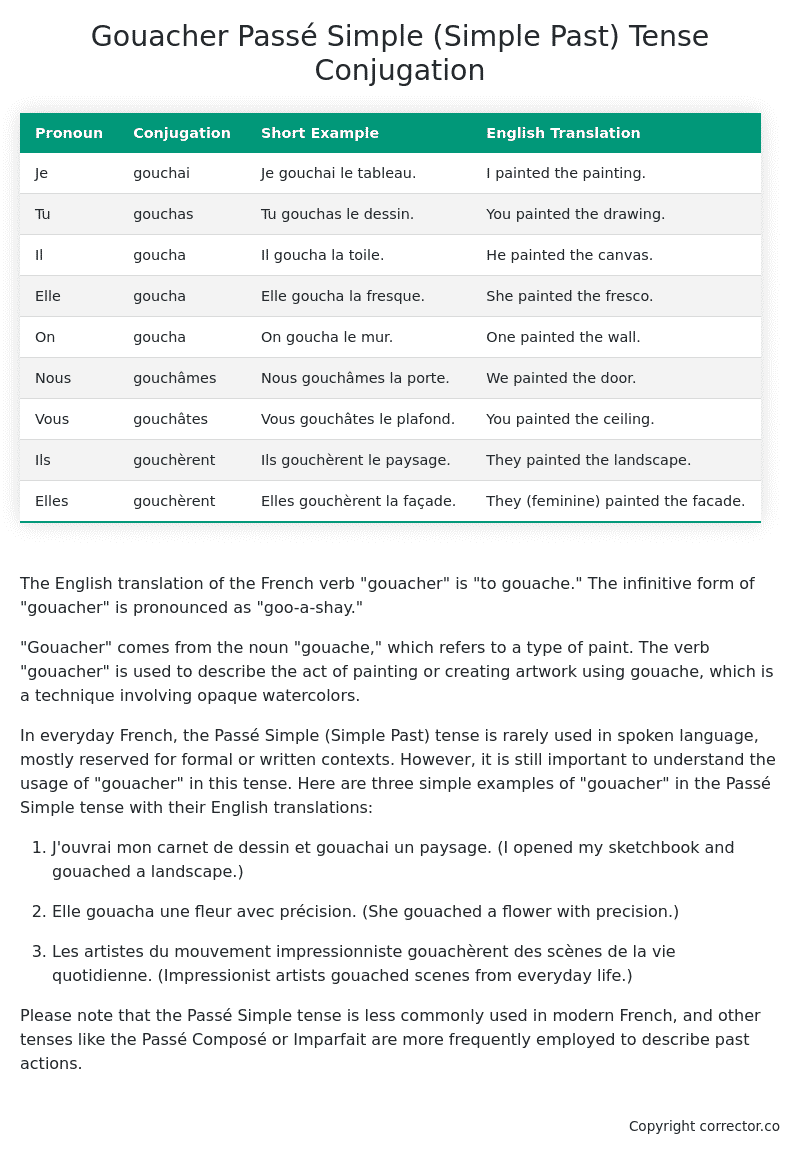Passé Simple (Simple Past) Tense Conjugation of the French Verb gouacher
Introduction to the verb gouacher
The English translation of the French verb “gouacher” is “to gouache.” The infinitive form of “gouacher” is pronounced as “goo-a-shay.”
“Gouacher” comes from the noun “gouache,” which refers to a type of paint. The verb “gouacher” is used to describe the act of painting or creating artwork using gouache, which is a technique involving opaque watercolors.
In everyday French, the Passé Simple (Simple Past) tense is rarely used in spoken language, mostly reserved for formal or written contexts. However, it is still important to understand the usage of “gouacher” in this tense. Here are three simple examples of “gouacher” in the Passé Simple tense with their English translations:
-
J’ouvrai mon carnet de dessin et gouachai un paysage.
(I opened my sketchbook and gouached a landscape.) -
Elle gouacha une fleur avec précision.
(She gouached a flower with precision.) -
Les artistes du mouvement impressionniste gouachèrent des scènes de la vie quotidienne.
(Impressionist artists gouached scenes from everyday life.)
Please note that the Passé Simple tense is less commonly used in modern French, and other tenses like the Passé Composé or Imparfait are more frequently employed to describe past actions.
Table of the Passé Simple (Simple Past) Tense Conjugation of gouacher
| Pronoun | Conjugation | Short Example | English Translation |
|---|---|---|---|
| Je | gouchai | Je gouchai le tableau. | I painted the painting. |
| Tu | gouchas | Tu gouchas le dessin. | You painted the drawing. |
| Il | goucha | Il goucha la toile. | He painted the canvas. |
| Elle | goucha | Elle goucha la fresque. | She painted the fresco. |
| On | goucha | On goucha le mur. | One painted the wall. |
| Nous | gouchâmes | Nous gouchâmes la porte. | We painted the door. |
| Vous | gouchâtes | Vous gouchâtes le plafond. | You painted the ceiling. |
| Ils | gouchèrent | Ils gouchèrent le paysage. | They painted the landscape. |
| Elles | gouchèrent | Elles gouchèrent la façade. | They (feminine) painted the facade. |
Other Conjugations for Gouacher.
Le Present (Present Tense) Conjugation of the French Verb gouacher
Imparfait (Imperfect) Tense Conjugation of the French Verb gouacher
Passé Simple (Simple Past) Tense Conjugation of the French Verb gouacher (You’re reading it right now!)
Passé Composé (Present Perfect) Tense Conjugation of the French Verb gouacher
Futur Simple (Simple Future) Tense Conjugation of the French Verb gouacher
Futur Proche (Near Future) Tense Conjugation of the French Verb gouacher
Plus-que-parfait (Pluperfect) Tense Conjugation of the French Verb gouacher
Passé Antérieur (Past Anterior) Tense Conjugation of the French Verb gouacher
Futur Antérieur (Future Anterior) Tense Conjugation of the French Verb gouacher
Subjonctif Présent (Subjunctive Present) Tense Conjugation of the French Verb gouacher
Subjonctif Passé (Subjunctive Past) Tense Conjugation of the French Verb gouacher
Subjonctif Imparfait (Subjunctive Imperfect) Tense Conjugation of the French Verb gouacher
Subjonctif Plus-que-parfait (Subjunctive Pluperfect) Tense Conjugation of the French Verb gouacher
Conditionnel Présent (Conditional Present) Tense Conjugation of the French Verb gouacher
Conditionnel Passé (Conditional Past) Tense Conjugation of the French Verb gouacher
Conditionnel Passé II (Conditional Past II) Tense Conjugation of the French Verb gouacher
L’impératif Présent (Imperative Present) Tense Conjugation of the French Verb gouacher
L’impératif Passé (Imperative Past) Tense Conjugation of the French Verb gouacher
L’infinitif Présent (Infinitive Present) Tense Conjugation of the French Verb gouacher
L’infinitif Passé (Infinitive Past) Tense Conjugation of the French Verb gouacher
Le Participe Présent (Present Participle) Tense Conjugation of the French Verb gouacher
Le Participe Passé (Past Participle) Tense Conjugation of the French Verb gouacher
Struggling with French verbs or the language in general? Why not use our free French Grammar Checker – no registration required!
Get a FREE Download Study Sheet of this Conjugation 🔥
Simply right click the image below, click “save image” and get your free reference for the gouacher Passé Simple tense conjugation!

Gouacher – About the French Passé Simple (Simple Past) Tense
Formation
Usage
Narration
Historical Context
Interactions with other tenses
Passé Composé
Imparfait
Conditional and Subjunctive
Summary
I hope you enjoyed this article on the verb gouacher. Still in a learning mood? Check out another TOTALLY random French verb conjugation!


